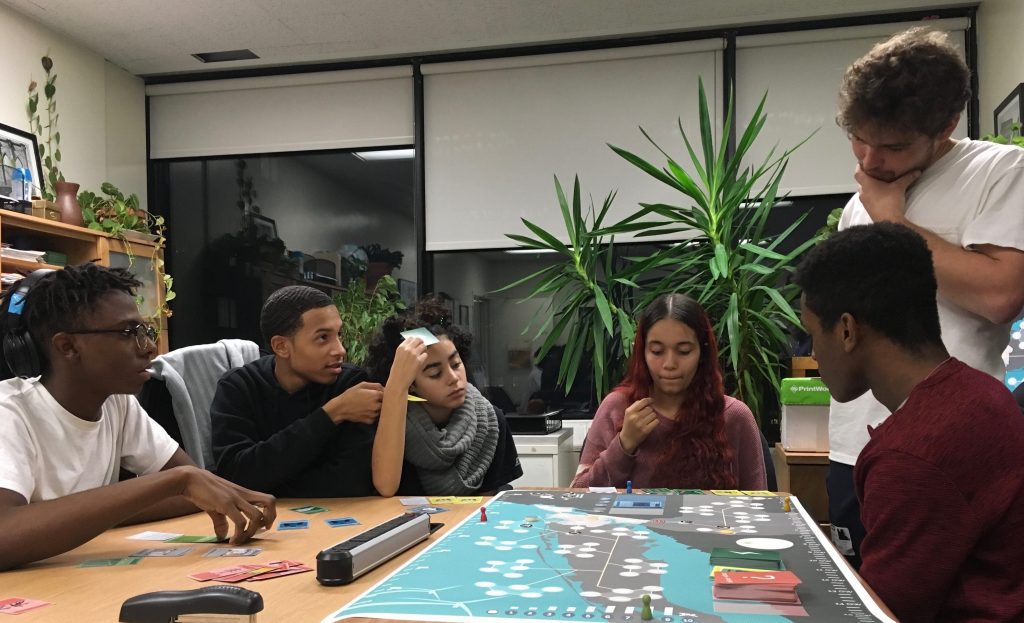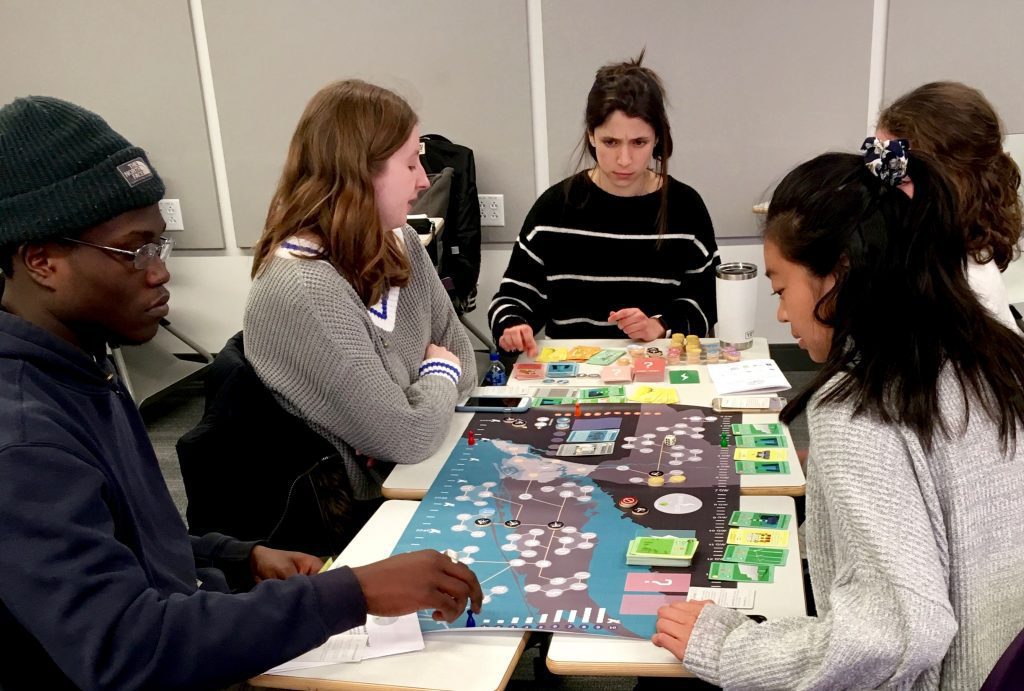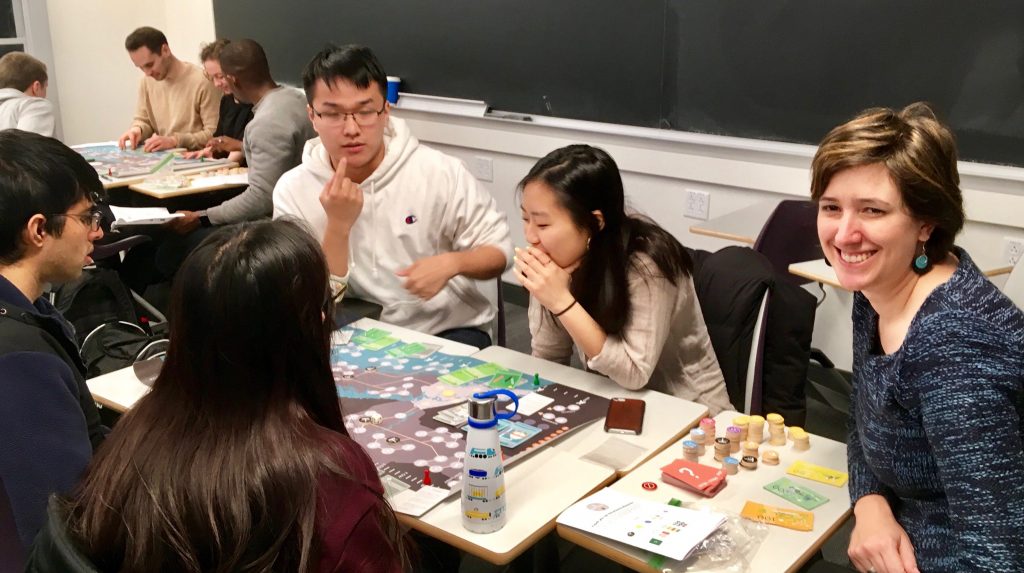“I am evangelizing about the game to fellow faculty at Vanderbilt.” Jonathan Gilligan
“Energetic is an invaluable energy policy tool for understanding the complexity of the issue.” Shay O’Reilly, Sierra Club
“The game is genius. It checks all the boxes that an up-and-coming climate activist would want to know.” Kayla Wagonfeld, Yale undergraduate
Energetic is a four-player cooperative challenge in which you work to decarbonize New York City by building 16 GW of carbon neutral energy by 2035 (in the Green New Deal version) or 2050 (in the standard version). You can build entirely with renewables (wind, water and solar), or, by doing research before construction, include advanced nuclear power or natural gas with carbon capture (CCS). The game can be ordered here.
Info about Energetic spread thanks to researcher Jesse Jenkins at the Harvard Kennedy School (now at Princeton), who live-tweeted his play of our beta version in December, 2018. In our first production run of the game, which comes with a map board, three card decks, and 142 infrastructure pieces, we produced and sold 62 sets to players at organizations including Yale University, Nature Energy, NYSERDA, Con Ed, Boston Consulting Group, Federal Energy Regulatory Commission (FERC), and the British Government’s Department for Business, Energy and Industrial Strategy.
Nine sets of a modified version, set in the fictional African country of Wakanda, are used in Dr. Paulina Jaramillo’s Sustainable Energy for Developing Countries class at Carnegie Mellon University in Pittsburgh, with four additional sets at Carnegie Mellon’s campus in Africa.
The game is an entertaining, effective learning tool, and can be played by anyone from teenagers to post docs. During development, Energetic has been tested and enjoyed by people ages 11 to 60; middle school students, MIT Ph.D.’s, former commodity traders, and leaders at environmental NGO’s.
As of July, 2024, there are over 450 sets in use around the world, and professors and teachers at Carnegie Mellon, Vanderbilt University, Wofford College, Bronx High School of Science, and Hunter College High School have made Energetic a regular part of their classes. See testimonials here and here.
Energetic is available through our partner, Artist As Citizen, a 501(c)3 arts organization. Order form. Questions: richard@thecityatlas.org
Can you keep the lights on in NYC in 2030?
Feedback from energy researchers Jesse Jenkins, Scott Burger and Max Luke (from Princeton, MIT and the Harvard Kennedy School)
“Our career-long aspirations achieved in one night!”
“There are certain components of this that are super accurate.”
“I’d been waiting for something like this because, after years of writing about how to continue civilization without wrecking the world, I kept thinking that a game might be an easier way to help people weigh the thorny consequences that come with every strategic choice.” Nathanael Johnson, Grist
Feedback from high school students at The Point, a youth center in the Bronx:
“This game is perfect.”
An energy policy game group in Washington, DC: “We had an intro Wednesday with players with broad and comprehensive experience in the public, private and non-profit/advocacy sectors (including FERC, World Bank, UN, Tesla, et al.), domestic and international, large and small, with specialties in clean energy, climate, environment, economics and finance, development, policy, tech, business, and organizing – we loved the game and think it’s a terrific teaching, strategic thinking, and team-building tool.” John Hansen, Paradigm Project
Demoing Energetic, beta version of a new board game by @cityatlas, with help from @burgersb & @max_energy
— Jesse D. Jenkins (@JesseJenkins) December 5, 2018
In this cooperative game (think Pandemic), your challenge is to build 16 GW of zero-carbon electricity to decarbonize NY.
Takeaway so far: decarbonization is freakin hard! pic.twitter.com/aYQSJYybu0
“I kept thinking, ‘Oh, they thought of that? Wow, they thought of that!’” Sam Arons, Lyft’s head of sustainability (quoted in Grist)
“This game is incredibly well researched, thoughtful, and fun. It’s grounded in the challenges we face as a society to make this transition while demonstrating just how feasible it is with collective action rooted in shared values. This is a very useful and practical tool for bringing more people into this work.” Ryan Madden, Long Island Progressive Coalition
Last night I along with friends from @NYRenews played Energetic a game where you build a #RenewableEnergy power grid for NY to meet 2035-2050 targets. It was great! The game teaches about grid infrastructure, RE tech, & mitigating #ClimateCrisis. Thanks @cityatlas! #PlayEnergetic pic.twitter.com/UbXGHh40BW
— Adrien Salazar (@adrien4ej) October 4, 2019
“I wanted to contact you as I took Paulina Jaramillo’s class last semester on Sustainable Energy for the Developing World and was introduced to Energetic. I recently graduated from the Energy Science, Technology and Policy program at Carnegie Mellon and have started working at the Caribbean Green Technology Center at the University of the Virgin Islands in St. Thomas, USVI. As part of the center we are working on outreach, particularly to students. Your game is a perfect opportunity for high school or college students to learn about the energy landscape and the many factors that go into making any decision.” Ariel Stoltz, University of the Virgin Islands
“I’m still thinking about the game, and would love to play again sometime.“ Eric Thurm, journalist and author of Avidly Reads Board Games
(Updated 8/2/24.)



Credits: The development of Energetic is a group effort by the City Atlas teams of 2018/2019, and built on work by prior years of City Atlas researchers. Game mechanics by Truly Johnson and Connor Haseley and City Atlas team, board and piece design by Isil Akgul, card design by Janet Tam, instruction design by Theo Miller, editing by Archie Kinnane, project coordination by Ashley Brown, trainers and V.2.0 team: Archie Kinnane and Theo Miller, creative director for City Atlas, Richard Reiss, team beta testers: Erik Berg, Bridget Scanlon, Luke McGinty. Energetic was made possible with logistical support from Douglas Price, Peter Marcotullio, and our partner The Institute for Sustainable Cities at Hunter College. Many thanks to Jesse Jenkins and Eric Hittinger for giving us notes on the prototype. Inspiration, David JC MacKay, FRS and Greta Thunberg.
Sources: An educator’s guide is in the works to provide the background for the many metrics used in the game. For an overview, some broad sources will be listed here, along with the observation that there is an amazing level of clarity developing as more energy data resources and research material becomes available to the general public online. Here are 70:
Operating US Power Plants by Capacity, Age, and Fuel (Grubert 2018)
“The Green New Deal: The Enormous Opportunity in Shooting for the Moon” (Saul Griffith 2019)
Saul Griffith’s Climate Solution (Griffith 2012 YouTube 8 minutes)
“The Energy Problem – Following the Numbers” A talk at Stanford (Griffith 2018)
“1000 Cheeseburgers: A New Map of America’s Daily Energy Use” (Griffith 2016)
“Infrastructure and Climate Change” (Longnow.org| Griffith 2015)
Special Report: Global Warming of 1.5C – Summary for Policymakers (IPCC 2018)
Special Initiative for Rebuilding and Resiliency (NYC.gov 2013)
“Deadline 2020” (C40 Cities 2016)
Post Carbon Institute “Our Renewable Future” (Heinberg, Fridley 2017)
“Solar Energy in the Context of Energy Use, Energy Transportation, and Energy Storage” (MacKay 2013)
“Beyond Three Thirds: The Road to Deep Decarbonization” (BNEF Liebreich 2018)
“Flexible Power Grid Resources” (Barnhart 2012)
McKinsey “Global Energy Perspective 2019”
“Lazard: Levelized Cost of Energy, Levelized Cost of Storage 2018”
“Climate Change Clean Energy Policies Guide” (Vox 2019) and Interactive Energy Policy Simulator
“Electrification & Decarbonization: Exploring US Energy Use” (NREL 2017)
“Global Pumped Hydro Atlas” (Australian National University 2019)
“20M Boost for Business Innovators Powering the UK’s Hydrogen Economy” (UK.Gov BEIS 2018)
Sources on energy storage in EU, including hydrogen storage (Tom Brown 2019)
“Paris, An Air of Change” (Elioth 2015)
“Building the Political Mandate for Climate Action” (Rebecca Willis 2019)
“Percent for Climate: A Proposal for NYC” (City Atlas 2017)
“How the Public Got Behind Texas Wind Power” (Texas Tribune, 2013)
“Citizen Deliberation is the Gateway to a Better Politics” (The Economist 2019)
“Ireland Must Listen to Citizen’s Assembly on Climate Change” (The Irish Times, 2018)
“Citizens’ Assemblies: Guide to Democracy That Works” (Gerwin 2018)
“The Challenge of Communicating Unwelcome Climate Messages” (Tyndall Centre | Minns, Rayner 2015)
“Cars, ‘Yellow Vests,’ and the Crisis of Democracy” (Lazare 2018)
“The Long Island Solar Farm” (US Department of Energy 2013)
“A Battle is Raging over the Largest Solar Farm East of the Rockies” (NPR 2019)
“Powerlines: The Next ‘Green New Deal’ Battlefront?” (E & E New, 2019)
“US Withdraws from Wind Energy Power Line Project” (Reuters 2018)
“How the Nuclear ‘Dread’ Zone Handicaps Public Support” (Axios 2019)
“Quantifying the Hurricane Risk to Offshore Wind Turbines” (Rose et al 2012)
“Britain Has Gone Nine Days Without Wind Power” (Bloomberg 2018)
“‘Unprecedented’: Energy Operator in Daily Fight to Keep Lights On” (Sydney Morning Herald, 2019)
“South Africa Crippled by Rolling Blackouts, Weeks Before an Election” (NYT 2019)
“Shareholders Approve 2GW Snowy 2.0 Pumped Storage for Australia” (Hydroworld 2019)
Blenheim-Gilboa Pumped Storage Power Station [New York State] (Wikipedia)
“New England’s Largest Battery is Hidden Inside a Mass. Mountain” (WBUR 2016)
“Projecting the Future Levelized Cost of Electricity Storage Technologies” (Schmidt et al. 2019)
“Minnesota Study Finds It Cheaper to Curtail Solar than to Add Storage” (Utility Dive 2019)
“Nuclear Power in the Age of the Green New Deal” (Wisconsin Public Radio 2019)
“Burden of Proof: Renewables and Nuclear Power” (Brown 2018)
“The Two Key Questions About Going to 100% Renewables in Los Angeles” (Utility Dive 2018)
“Net Zero Energy Systems” (Davis et al. 2018)
“California’s Energy Future – The View to 2050” (California Council on Science and Technology 2011)
“The Hottest Climate Trends of 2019” (SITRA/Granlund 2019)
Deep Decarbonization Pathways Project (2015)
“Sustainable Energy Without the Hot Air” (MacKay 2009)
“The Simplest Way to Build Trust” (Desteno Harvard Business Review 2014)
“Even Arbitrary Norms Influence Social Decision Making” (Pryor 2018)
“Handing on a Sustainable Future” (Nature 2014)
“Cooperating with the Future” (Hauser et al. 2014)
“Climate Change Public Conversation Series | Desk Review” (Scottish Government 2016)
“The Experimental Generation of Interpersonal Closeness” (Aron et al. 1996) and “The 36 Questions That Lead to Love” (NYT 2015)
“Was Freud a Minivan or SUV Type of Guy?” (NYT 2000)
“Mainstreaming Low-Carbon Lifestyles” (Climate Outreach 2019)
“2000 Watt Society: When the Future Becomes Reality” (Swiss.info 2016)
Energetic is a co-production of artistascitizen.org. ©2019 City Atlas/AAC